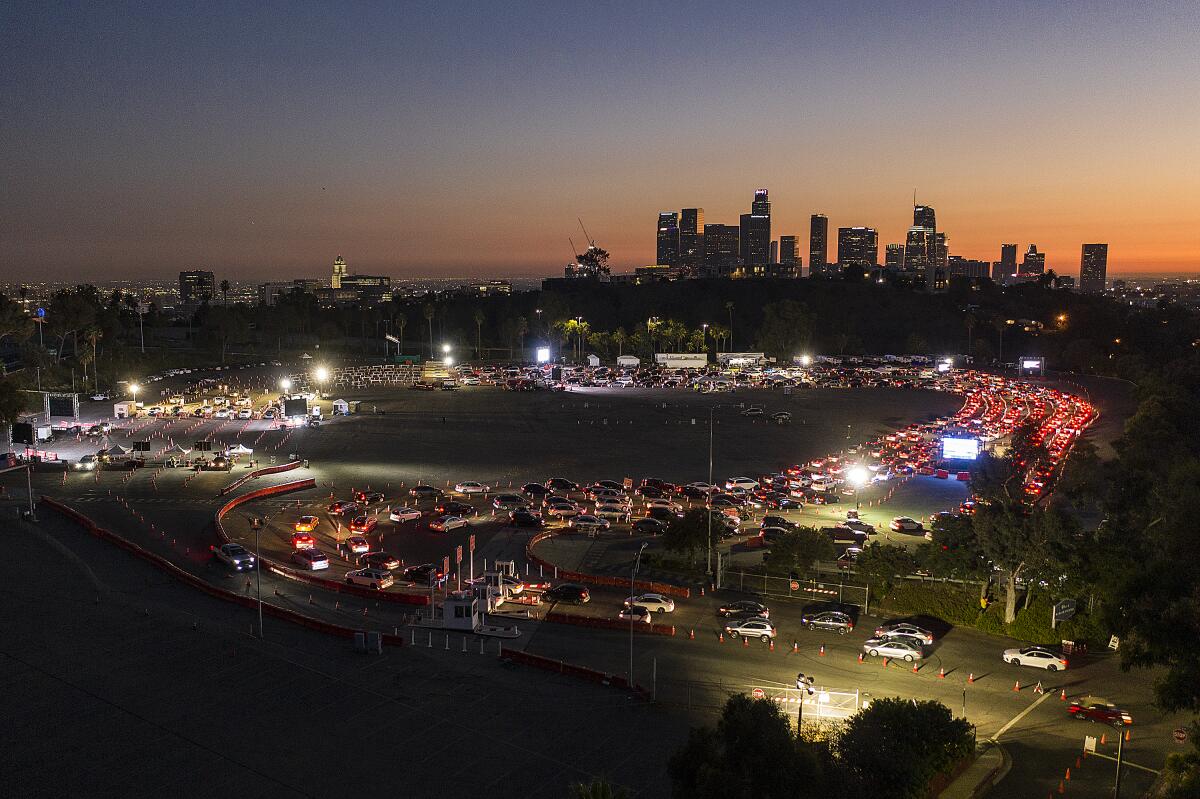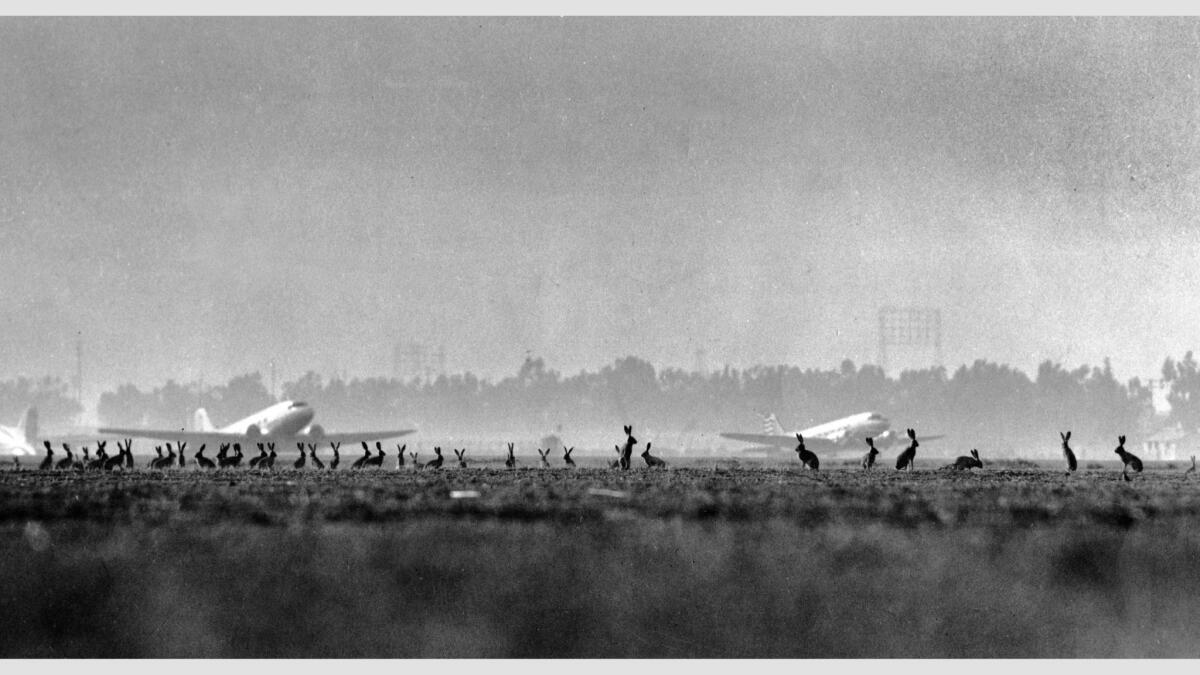Today’s Headlines: Tough to trace

- Share via
In Los Angeles, officials don’t fully understand why coronavirus infections are surging.
TOP STORIES
Tough to Trace
Conditions inside hospitals in the U.S. are deteriorating by the day as the coronavirus rages and the confirmed death toll has surpassed 250,000. In Los Angeles County, officials say hospitals are in danger of being overwhelmed and significant new restrictions are possible. In recent days they have pleaded with residents to cancel social gatherings and announced limited hours for businesses.
But the clear messaging in L.A. belies a murkier reality: We don’t fully understand why so many people are becoming infected.
For the vast majority of people sick with COVID-19 in L.A. County, officials cannot determine where they contracted the virus. National data show that fewer than half of people with the virus know where they caught it.
The data limitations speak to the challenges the COVID-19 pandemic poses for contact tracing, a tried-and-true method that public health departments around the world use to track how an infection spreads. With so many people sick with COVID-19 or infected but showing no symptoms, identifying where someone contracted the virus becomes nearly impossible.
But we do know there is plenty of other information pointing to indoor environments as primary sources of coronavirus spread, particularly when people don’t wear masks. The more time people spend together and the closer together they are, the more the risk increases.
In L.A. County, recent clusters of cases have been linked to dinner parties and other kinds of indoor social gatherings, including those celebrating the Dodgers and Lakers championships, officials say. Meanwhile, the number of new people being infected with the coronavirus in the county has more than doubled in the last few weeks.
More Top Coronavirus Headlines
— There’s no silver bullet that will bring the COVID-19 pandemic to a rapid close, but an effective vaccine is the next best thing. Here are four takeaways from the race for a COVID-19 vaccine.
— Why the third wave of the coronavirus could be the most difficult for California.
— Newly published pictures of Gov. Gavin Newsom at a birthday dinner show him seated with top lobbyists for the California Medical Assn. around a table in a private dining room at an upscale Napa Valley restaurant, undercutting the governor’s description of the party being held outdoors.
For more, sign up for Coronavirus Today, a special edition of The Times’ Health and Science newsletter.
Start your day right
Sign up for Essential California for the L.A. Times biggest news, features and recommendations in your inbox six days a week.
You may occasionally receive promotional content from the Los Angeles Times.
Tag Team Campaigning
The battle for the U.S. Senate runs through Georgia, where runoff elections for two seats will take place Jan. 5. Democrats would need to win both seats to retake control of the Senate, whereas Republicans need only one victory to retain their edge.
Still, both sides’ candidates are campaigning as dynamic duos: Democrats Jon Ossoff and the Rev. Raphael Warnock in one corner, Republican incumbents David Perdue and Kelly Loeffler in the other, as they hold joint events and frame their stump speeches around what they could accomplish — or stop — together in Washington.
Campaigning as a ticket has clear advantages and efficiencies in a statewide race, particularly during a pandemic. It can also serve to bolster and balance candidates’ resumes. But there are risks as well to linking fates. If one candidate goes down, so may the other.
More Politics
— President-elect Joe Biden’s winning tally is approaching a record 80 million votes, as Democratic bastions continue to count ballots and the 2020 election cracks turnout records.
— President Trump’s campaign has paid $3 million for a recount of two heavily Democratic Wisconsin counties, saying that they were the site of the “worst irregularities,” although no evidence of wrongdoing has been presented and state elections officials have said there was none.
— There will be more women of color sworn in to the 117th U.S. Congress than ever before, with at least 51 women of color elected. Ballots are still being tallied in two close races, so the number could grow.
Feeling China’s Economic Wrath
China has increasingly resorted to wielding its economic heft as a diplomatic weapon. Case in point: South Korea, where an American missile interceptor was installed a few years ago — over China’s objections that it threatened its national security.
Corporations including retailer Lotte, South Korea’s fifth largest conglomerate, and carmaker Hyundai, the second largest, faced steep declines in sales and stringent regulations in China that cost them hundreds of millions of dollars. Videogame makers and K-pop stars saw their products no longer welcome, either.
And, as the fifth story in our series “In China’s Shadow” shows, even small-business owners have felt the effects to this day. Chinese tourism to South Korea evaporated, leaving restaurant owners and shopkeepers in the lurch.
FROM THE ARCHIVES
In 1946, Los Angeles Municipal Airport was on track to become a major travel hub. But first, it had to court and welcome major airlines to the terminals.
Ahead of the airlines’ December 1946 arrival, Times photographer Art Rogers visited the airport on Nov. 19 to snap a photo. He found dozens of jackrabbits grazing and hopping about the property. Times editors and readers loved the image, but city officials found nothing funny or cute about it — it ran counter to the image of a bustling airport the city hoped to project, The Times later wrote.
Los Angeles Mayor Fletcher Bowron went so far as to insist that the photo wasn’t real and the rabbits didn’t exist, even as passengers reported seeing them running beside planes. Bowron later capitulated and acknowledged their existence. Over the years, the rabbit colony was overtaken by foxes, which have since disappeared.

Want more of the Los Angeles Times archives? We’re on Instagram.
CALIFORNIA
— The state budget faces a dramatic boom-and-bust period over the next four years, analysts said. The roller-coaster period could begin with a $26-billion tax windfall and later plunge to a projected deficit of $17.5 billion by the middle of 2025.
— A fast-moving brush fire at the California-Nevada border ravaged the small town of Walker in Mono County, burning many buildings and killing at least one person.
— A Los Angeles police sergeant who was repeatedly disciplined over posts on his personal Facebook and Instagram accounts is suing the LAPD and its top commander, alleging they violated his constitutional rights.
— Two halls at UC Berkeley had their names removed in response to growing awareness of their namesakes’ controversial legacies, campus officials said.
Support our journalism
Subscribe to the Los Angeles Times.
NATION-WORLD
— Immigration and Customs Enforcement is moving to deport a group of women at a Georgia detention center who say a gynecologist performed overly aggressive or unnecessary surgeries on them without their consent. The women and their lawyers say it’s retaliation for their involvement in the case.
— The devastation caused by Hurricane Iota became clearer as images emerged showing piles of wind-tossed lumber that used to be homes and concrete walls that were pounded into pieces by the second Category 4 storm to blast Nicaragua’s Caribbean coast in two weeks.
— A shocking Australian military report into suspected war crimes has found evidence that elite Australian troops unlawfully killed 39 Afghan prisoners, farmers and civilians.
— The Thai king’s companion vanished after upsetting the queen. Now she’s back in the spotlight, playing a key role in the palace’s PR blitz as pro-democracy protests grow.
HOLLYWOOD AND THE ARTS
— In a stunning move, Warner Bros. will release its much-anticipated sequel “Wonder Woman 1984” on HBO Max and in U.S. theaters on the same day — Dec. 25.
— Most of the cast of “The Real Housewives of Salt Lake City” are members of the Church of Jesus Christ of Latter-day Saints, but they aren’t exactly model Mormons.
— Los Angeles-born writer Charles Yu won the fiction prize for his third book, “Interior Chinatown,” at the 2020 virtual National Book Awards.
— It’s a Christmas miracle, Charlie Brown! The lovable loser, the Peanuts gang and their iconic holiday specials will be back on broadcast television this year after all.
BUSINESS
— After nearly two years of review following two deadly crashes, the U.S. Federal Aviation Administration has cleared Boeing’s 737 Max for flight again.
— Utility giant PG&E Corp. has placed its fate in the hands of a new chief executive with a record of reducing accidents, cutting costs and building bridges.
SPORTS
— At the NBA draft, Anthony Edwards was selected No. 1 by the Minnesota Timberwolves. Here’s a recap of all 60 picks.
— Less than a month after winning their first World Series in 32 years, the Dodgers have issued layoffs across the organization, according to people with knowledge of the situation.
Free online games
Get our free daily crossword puzzle, sudoku, word search and arcade games in our new game center at latimes.com/games.
OPINION
— The worst thing about Newsom’s French Laundry dinner? It was with a lobbyist, columnist Robin Abcarian writes.
— Holding Thanksgiving celebrations right now isn’t worth the risk and stress, business columnist Michael Hiltzik writes. But for those who want to hold on to the tradition, why not postpone it to the spring?
WHAT OUR EDITORS ARE READING
— Long before Republican senators began publicly denouncing how Georgia Secretary of State Brad Raffensperger handled the voting there, he withstood pressure from the Trump campaign to endorse the president for reelection. (ProPublica)
— Researchers are teaming up to create a library of scents that would identify and even re-create aromas that were around between the 16th and early 20th centuries. (The Guardian)
ONLY IN L.A.
In one of the most turbulent years in recent memory, the books of groundbreaking science fiction writer Octavia E. Butler are drawing renewed interest. Butler, who died in 2006, grew up in northwest Pasadena. Southern California’s local libraries had a profound effect on her, as this interactive map shows. She also traveled everywhere by bus. “I used to write on buses. Los Angeles is so spread out that almost any bus ride will be a long one. The time proved perfect for writing,” Butler wrote, according to “A Handful of Earth, a Handful of Sky.”
Comments or ideas? Email us at headlines@latimes.com.
Sign up for Essential California
The most important California stories and recommendations in your inbox every morning.
You may occasionally receive promotional content from the Los Angeles Times.






